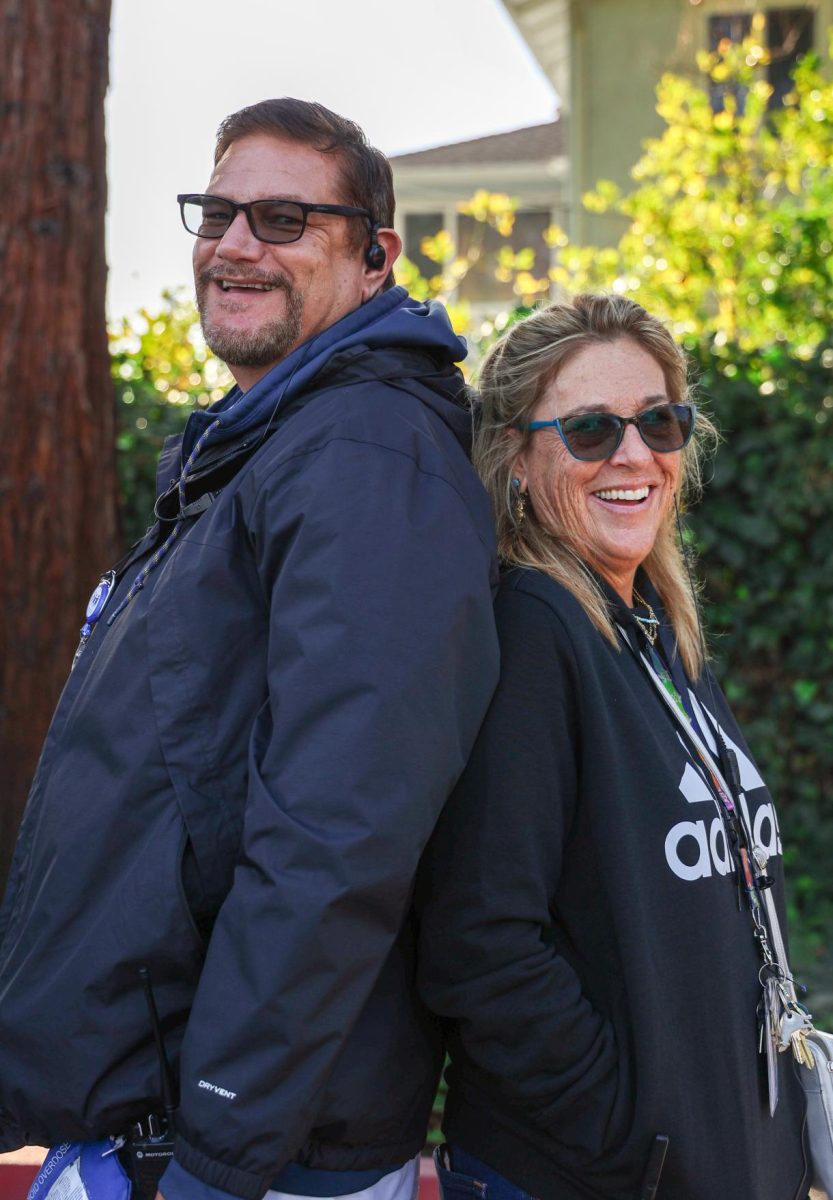When students step out of their classrooms during a class period, chances are they are likely to bump into one of the campus supervisors patrolling the halls. Whether for emotional support, safety or simple questions, a supervisor’s job is to be ready to lend a helping hand.
A common misconception about campus supervisors’ jobs is that they monitor the halls only to catch students roaming around and send them back to class. Campus supervisor Frank Giacomelli shared that in reality, his job consists much more than keeping an eye on the halls. He also provides mental support for students, helps create a safe campus where only students and staff wander and builds friendships with students to create a welcoming environment.
“Campus supervisors are here to provide safety and security for students first and foremost, and staff secondly. A day in our lives is making sure that our students are helped in all senses of the word,” Giacomelli said. “Whether it’s something that they need in class, out of class, from a mental health standpoint, from an educational standpoint.”
Another misjudgement is that they send students to the office and do not care about the wellbeing of the students they confront. Social science teacher Daniel Skapinsky, however, has noticed that supervisors prioritize students’ feelings and mitigate the situation before bringing in administrators.
“I often see Frank and Sharon make connections with students by informally counseling them to make good choices. This helps catch problems low before they become larger problems,” Skapinsky said. “The campus supervisors really care about students, and it shows in their positive interactions with students.”
Many students around campus feel protected with the welcoming campus and academic environment that is built on communication. Junior Lucas Ackerman observed that the supervisors’ counseling approach is more effective in problem solving, leading to stronger connections between students and administrators.
“Even if you’re in trouble, you’ll get to know them. They’ll still get you in trouble if you do something wrong, but they’re cool about it and have a conversation with (students) about it, so it builds a better relationship,” Ackerman said.
Although campus supervisors primarily focus on supporting students, many teachers also benefit from the assistance they provide. Giacomelli shared that he values building relationships with teachers to further support them in all aspects.
“The more all campus supervisors can make it easier for the teachers, I feel like it’s going to make it easier for them to be able to do (teach and assist students) in a classroom, which is to give you guys the best education that you guys can have,” Giacomelli said.
Lead supervisor Sharon Ratliff wants to make sure all students feel welcome at SCHS and wants to be available to them in times of need.
“I’ll give you a hug if you need it,” Ratliff said. “I consider all you guys my kids. I love you guys as my kids, and if anything ever happens to any of you, I’m devastated.”
Campus supervisors are increasingly becoming welcomed by teachers into classrooms so students have the opportunity to make connections with the staff and feel less intimidated by them. Skapinsky often invites supervisors to come to his classrooms and get to know his students and bond with each other.
“I like to have Frank and Sharon drop in to my class so students can interact with them in another informal, positive way. Students remember these positive interactions, so they are more likely to cooperate with school policies,” Skapinsky said.
Furthermore, the peace that campus supervisors bring to the hallways has led to less disruption around campus, Skapinsky observed. He said there has been a decrease in students roaming the halls, which keeps classes from being disrupted.
“The staff is really appreciative of the large contributions Frank makes to the SCHS community, especially to the supervision of the hallways,” Skapinsky said. “This calmness in the hallways brings up the morale of the school as a whole and the staff in particular.”
Giacomelli explained that he hopes to be a safe person for students to come to if in need.
“I want students to have a great education, and I feel I can be part of that by keeping students and staff safe by giving you guys an environment that is welcoming,” Giacomelli said. “I hope that if students read this and they have questions, I’d be more than happy to talk with any students that want to learn more about what we do.”
After 15 years of keeping watch over SCHS, Ratliff is retiring at the end of this semester. Ratliff, however, regarded her time on campus dearly.
“I’m going to miss all of you more than you know. Each of you has played a unique role in my time here, and the connections we’ve made will always hold a special place in my heart. From our daily interactions to the moments of laughter and learning, you have all enriched my life in ways I can’t fully express,” Ratliff said. “Thank you for the incredible privilege of being part of your journey. Take care and keep shining brightly!”
Reporting by Samira Ahemed


